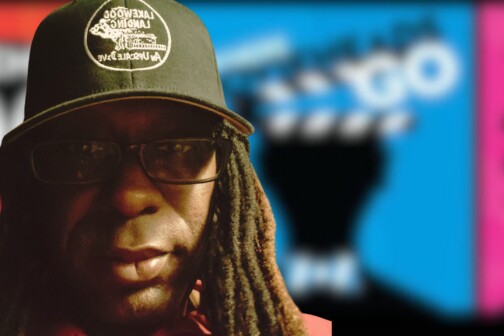“Morris Kermit Woods, I’ll never understand you,” Sarah said wearily. “All that fool scribbling! Every night! Such a waste!” She let the dog in and went muttering to bed.
He had not heard her, not really. In most things they were compatible, but in this he had to go it alone. He had learned, when he sat down to put his thoughts on paper, to shut her off somewhere between the ear and the brain. She had never read anything he had written. This hurt him, for the writing had become the most important thing in his life. He thought up the stories during the day as he drove about Dallas in his taxicab. It didn’t hamper his driving. He found he could make right turns and small talk with his passengers and still keep the flow of the story moving through his mind. Sometimes he would try one out on the more gregarious passengers. When the reception was good he could hardly wait to get home and put it all down.
Morris lived in a rented cottage on Neal Street in Oak Cliff. Now, way past supper, he sat at the kitchen table under a dim light, his pipe and tin of Prince Albert and his pads of ruled paper all in place, and he wrote slowly, laboriously, his thick fingers curled around a stubby pencil.
Once a flower happened to grow in the midst of a weed garden and a weed growing nearby betrayed the blossom to the weedmaster as he came strolling through his garden, saying, “Look Master, a despised flower dares to grow among us and spoil the conformity of this garden. . .”
Morris chuckled, pleased with himself.
. . .betrayed the blossom. . .
It had a nice ring. He licked the lead in the pencil and pressed it to paper.
. . .sopluck it out from us. . .
Morris Woods was a fat man, Fal-staffian in appearance if not in manner. The front of his shirt and the lap of his pants were pocked with holes burned by cinders from his ever-smouldering pipe. He was 58 years old. Darken the hair, remove the jowls and replace the missing molars, deflate the bulb on the nose and speculate how handsome Morris might have been 40 years ago in the hills of Arkansas. A flower in a weed garden? Well, not then, not a 1932 school dropout.
The lack of a formal education, the want of the rote of reading, writing and ’rithmetic hurt him now. He had never learned to spell very well. The mind forms thoughts with words and Morris had the words. They just came out a little warped on paper, phonetic little cripples. But for a long time, for most of his life as a matter of fact, this was not to bother him.
And then, when he was 57, Morris changed. It came at him all of a sudden, it seemed, from inside. Something seemed to break loose in his brain, not his sanity, not that, for his perception was heightened. It was an explosion that shook away the rust in his head. The wheels of his mind ran out of the ruts and he began to think about things that were, to him at least, wildly intoxicating. Sarah, who worked everyday sorting clothes at Mercury Cleaners, said it was foolish fancy.
Once a truthteller was born into a world of liars. . .
“Morris? Come to bed.”
One night you rise up screaming in bed and your daddy comes and takes you near the fire.
“What in the world is the matter? What has frightened you this way?”
“I don’t want to die.”
After a year of night-writing, Morris had finished, to his satisfaction, nine stories. He stacked them neatly in a box – labeled, “The Complete Works of Morris Kermit Woods” – and took them to a public stenographer.
Did she figure he could do anything with the stories if she did ’em up nice?
“I think so,” she said, taking his $50.
Morris made the rounds with his manuscript. He left his stories with professors who had ridden in his cab. He left them with people who passed themselves off as literary agents. He mailed them to publishers. No one encouraged him.
Yet Morris continued to write by night and persevere by day. His soiled and rather sad-looking manuscript found its way into my hands one evening last summer after Morris and I struck up an acquaintance in, of all places, an old graveyard. I was down in the weeds and neglect of the Western Heights Cemetery, up on the Trinity bluffs along Ft. Worth Avenue, trying to find tombstones of some Oak Cliff pioneers, when I looked up to see Morris bearing upon me like some sinister sexton.
“If you’re looking for what I think you’re looking for,” he declared, “then you’re way off the mark.”
“Oh,” I said, brushing the stickers off my pants leg, “You mean the Coombeses?”
“No,” he said, “I mean Clyde Barrow. Isn’t that who you’re looking for?”
“Clyde Barrow the outlaw?”
“Yep.”
“Well, no, not really. The Coombes family is supposed to be out here. . .”
“No markers like that,” Morris said emphatically. “I’ve read ’em all many times.” He looked at me steadily. “Most people,” he went on, “come out here to see Clyde’s grave.”
“Are you related?” I asked.
“Naw,” he said, “I’m just a cab driver. Now there’s Barrows left because I see them come here. They take care of the graves too. You see, I live a few blocks away and I like to come up here and sit, so to speak, with the dead.” Morris looked at me keenly. “It sounds funny I know, but how I explain it to the wife is that this cemetery does for me what church does for her. If you know what I mean?” He looked at me so earnestly that I was drawn to this big rough spirit.
We fell into a deep conversation there among the crab apple trees and tombs. Below us, to the east of the Trinity, the skyline shimmered in the heat like a mirage. Hours passed. The sun sank behind us, mellowing like a benign eye, and cast an orange spell upon the heights. We filtered the dying light like lenses, and felt in our lungs the noxious vapors that rose above the roar of the homeward-bound traffic. The skyline glowed.
“My throat’s dry,” Morris said at last, and we retreated to Al Cain’s 49’er club where we quenched our thirst and where Morris laid upon me his benediction, his complete works. He had run home to fetch them. Now he sat expectantly as my eye fell upon the first page.
“I can’t read them with you staring at me,” I said. “Give me a few days and I’ll get back to you.”
He was up and gone. Morris was clearly some kind of a character. What was it he had said in the cemetery? Something to the effect that the dead were outcasts, especially an outlaw like Clyde Barrow, and that he – Morris K. Woods – being an outcast himself (if self-styled) was naturally drawn to them. Hell, I understood that and hoped Morris was Bret Harte. He was not.
But had Morris read Nathanael West or Lewis Carroll or Dr. Seuss? Had he heard Charlie Mingus? Had he been on the road with Kerouac, to the opera with Barth, or simply writing in watermelon seed with Brautigan? Morris had peopled his stories with prophets and tramps and comics. Their adventures were zany, right out of a Three Stooges comedy, but there was also a serious undertone in the pieces.
The influence of the Bible was obvious, and Morris certainly seemed to have the countryman’s basic distrust of preachers. All his prophets were false ones.
There was a short fable on truth, a fable on a prophet, who, like Jonah, finds himself in the belly of a whale. Morris had his Jonah exit the whale by means other than the mouth.
There was a skit about a man and a woman dueling with riveting guns, a piece on a satyr-like preacher walking on Turtle Creek, a wildly disjointed bit about a man who preferred to sleep with pigs because his wife snored in stereo.
We met at Al Cain’s. We had a few beers.
“Morris,” I said at last, “Your pieces are interesting and original, but they’re not stories yet. They are wildly bizarre snatches of fables and such, but you haven’t developed them.”
He seemed crushed. We had a few more beers.
“Don’t be discouraged,” I said. “A lot of writers start with less than you show here. You’ve got great ideas. You handle dialogue well and there’s a nice Biblical roll to your sentences. But your stories have no structure that I can see.”
He shrugged. “Hung up and haywire, huh?”
“You can get off and going,” I insisted. “Look, in anything you undertake there are certain rules and techniques you have to learn and abide by, at least until you’ve proven you’re good enough to break the little rules in order to set higher ones. I don’t mind the misspelling, but no editor will take you seriously when you make simple grammatical mistakes. And don’t call your manuscript ’The Complete Works’ because it isn’t. You’re alive and still writing.”
Morris sighed. “I can’t go back to school at my age,” he complained.
“I don’t mean that.” We had a few more beers.
Before we split, I handed him my copy of the Summer 1968 issue of the Paris Review. “Read the interview with Jack Kerouac,” I said. “That ought to inspire you.”
He grabbed me by the arm. “I need something now,” he said, slurring his words. “You’re blowing the whistle on me. I’ve stopped and you’ve got my attention. But I’m dumb. I don’t know what I’ve done wrong, exactly. Well, write me a ticket, paint me a picture.”
“Okay,” I said, not so steady myself, but heady enough to pick up on his play. “If I were Chief Byrd, I’d give you a ticket for driving without brakes. If I were Lamar Hunt, I’d kick you off the tour for playing tennis without a net. And if I were Wernher Von Braun, and you were an astronaut, I’d say you were stabbing at the stars with a toothpick.”
Al shooed us out
I saw Morris one more time. We met at the Athens Strip and watched Diana King. Morris was sober in spite of the beers. He didn’t say much, just stared at Diana. “Me and my old lady we split,” he said at one point.
He handed me the Paris Review. “Kerouac’s a good man,” he said.
“You should read him.”
“I’ve started On The Road.”
“Did you get some books on style and technique?”
“Yeah,’ he said, “but 1 took em back.” He leaned across the table and bit down on his pipe. “Look,” he said, “I know you were trying to help me, but I don’t see no sense in doing what the book says. If a man wants to write like ever’body else, well all right. But it’s not for me. I don’t like to think of my mind as a tow-rope. I don’t follow nobody.”
But of course that was not true.
It was not long after that I got a letter from Morris. Just a note really, written from the Greyhound bus station. Sarah had found her another man, a Mexican who painted on black velvet, and they had run off to Houston. As for Morris, well, he was running off too, heading to Lowell, Mass., where, if the stars were right, he intended to meet up with and make a friend of Jack Kerouac. Kerouac was his kind of man, a wild man, a master of the outlaws, and surely he could teach Morris a thing or two.
Poor Morris, I thought. He doesn’t know he’s following a dead man.
Kerouac had died five years before.
Related Articles

News
Methodist Charlton Names New CEO and Steward Offloads Five More Hospitals for $1.1 Billion
Plus Texas Health Mansfield's new president and CEO, TimelyCare recognized by EY, and more.
By Bridget Reis

Hockey
What We Saw, What It Felt Like: Stars-Golden Knights, Game 1
Deja vu all over again. Kind of.
By Sean Shapiro and David Castillo

Movies
A Rollicking DIFF Preview With James Faust
With more than 140 films to talk about, of course this podcast started with talk about cats and bad backs and Texas Tech.
By Matt Goodman


